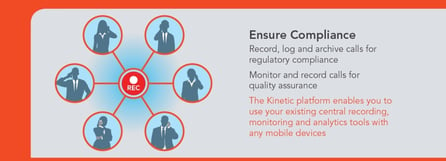January 11, 2019
Call recording is an increasingly important requirement across all communication channels – mobile, fixed line and SMS.
Gone are the days of communications coming through just one medium. Success in today’s competitive business climate means giving employees the ability to communicate with customers, partners and other external parties in ways that will streamline engagement and enhance productivity.
This means today’s businesses must be able to capture and archive communications of all types to meet regulatory compliance needs or customer service quality objectives.
Our solutions can embed on-network call recording capabilities into the communications services our customers utilise, enabling recording of on-network communications. Through our recent acquisition by Tango Networks, we offer the ability for communications to be seamlessly integrated with external cloud or premises-based recording platforms. That permits a compliance function that is flexible and easy to tailor to a businesses’ particular needs.
We offer several levels of call recording service which suit every situation and size of business, from an entry level option where call recordings are delivered via email, to a secure on-demand app based system and finally to a bespoke system which unleashes the “Big Data” held in your calls by enabling analysis of call intention, phonetic search, and integration with CRM systems via an API.
Mobile-X from Tango Networks is the centerpiece of a wide range of use cases, including Mobile Unified Communications, mobile workforce communications, and programs for remote working, work from home, telecommuting and business continuity.
Why use call recording?
Call recording formerly was a rarely used function for most SMEs. Only on the odd occasion would a recording be required and even then, the requirement would have been pre-planned, for training purposes, for example.
But usage requirements are on the increase, thanks to the implementation of MiFID II, which affects all businesses who are handling any kind of financial sale, advice, or transaction regardless of their size. Even small independent financial advisors will need some form of call recording.
Companies recognise the value call recording brings and are prepared to pay for it, so call recording is becoming part of the expected mix of a standard business voice services.
We have risen to these challenges by developing a considered mix of unified call recording solutions which can be tailored to suit business needs.
Call recording solutions for all sizes of business
Larger companies are likely to have made extensive investment already in recording systems for compliance, training purposes, or communications quality control. Because many of the earlier deployments of these systems have been premises-based, it’s likely that larger enterprises will have their compliance systems on their corporate premises.
Because of their lesser prior investment infrastructure, smaller companies are sometimes faster to adopt “mobile first” strategies, in which they make mobile devices the primary communications tools of employees. This means the compliance and recording tools they use must have mobile communications in scope. Also, if the company has already adopted UC-as-a-Service, or cloud based communications, they may also be ready to adopt cloud-based recording and communications archiving solutions.
In both cases, the trend is increasing toward becoming mobile first companies. But the larger companies often will need compliance approaches that support hybrid mobile and landline environments, while smaller companies that have already made the transition to mobile are less likely to worry about supporting a hybrid infrastructure. In addition, teleworking, remote working, virtual workplaces and work-from-home programs are increasingly critical to the operations of many companies and many of them require business-class mobile communications.
GDPR complicates mobile call recording compliance
One of the challenges with the EU’s new is how to maintain the separation between what is regulated communication that needs to be captured and recorded, and what is private communication that does not and, in fact, should not ever be recorded.
For example, if a business permits its employees to use mobile phones for business communications, it’s likely that some personal calls will be made on those devices. GDPR has very strict rules requiring the business to gain consent before personal data is captured, processed or stored.
So it is imperative that the business has a way to differentiate between business calls, which should be captured with consent by enterprise systems for processing and archiving, and the personal calls, which should proceed as normal on the mobile network and not be recorded by enterprise systems.
Tango Networks’ solutions provide exactly that capability to an enterprise, through the function of Dual Identity Management that automatically separates the business and personal communications. We work with a number of call recording compliance partners to deliver these GDPR-enhanced call recording capabilities for enterprise mobile communications.Contact us today to learn more about mobile call recording for your enterprise.

